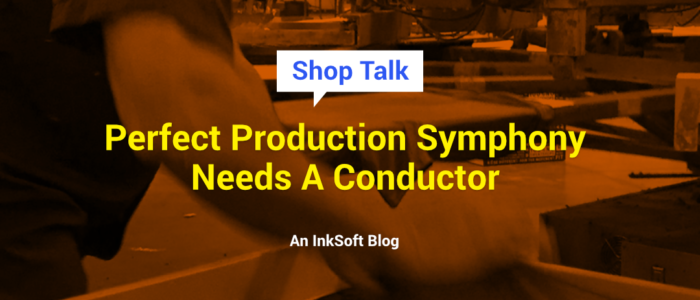Earlier this week I was speaking with a shop owner about production management. The shop in question was going through a rough period, and their veteran shop production manager simply was not executing his job at a level that the business needed.
I’m not going to go into all the details, but suffice it to say that the owner was less than thrilled.
During our discussion, I used a metaphor for the job that the production manager was similar to a conductor for an orchestra.
Think about that for a minute.
Each musician in the orchestra knows their place. What they have to do. When they need to play. Timing is crucial. They all have that musical skill.
So what do they need the conductor for then?
It’s simple.
The conductor is the one person that keeps the music flowing perfectly. By listening to what’s being played, he can anticipate any changes necessary with instant corrections. Just by waving his baton.
An emphasis here. Downplay a note there. Crank up the tempo, it sounds a little sluggish.
A talented conductor can make all the difference.
Just like a skilled production manager. For this article, let’s take a detailed look and see what are the most significant areas that need that coordination.:
Proactive Problem Solving
A great manager’s brain isn’t wired to today’s schedule as much as you think. Instead, that focus needs to be on any problems that might be lurking a few days or a week out.
- Are those 37 mediums here yet?
- We need another gallon of metallic gold ink for that job for Friday.
- Susie will be on vacation at the end of the month, do we have someone trained to step in her shoes?
- The screen room is backed up, and we’re getting busier in production for orders that have to ship.
By digging into problems several days before any job is due to start, many issues can be resolved well ahead of time. Like that conductor emphasizing a particular section or beat, when it’s done right the final result is seamless. You won’t ever notice the problem.
But when something gets skipped? It’s a glaring omission.
For this reason, your production manager needs to stay on top of things. The job is connecting the “what ifs” that could happen down the road. A good production manager makes it look effortless.
Professional Competence
In an orchestra, does the conductor have to know how to play every instrument?
Certainly not.
The skill is knowing how they should sound when played correctly. If they can play or even write music though, that gives them a better understanding.
The same holds true with production managers. They don’t need to know how to do every task in the shop, but for a bigger advantage having technical skill gives them an edge.
What you want is professional competence. This means that they should be able to discuss what success looks like. How to get it. When to teach it. Where improvement is needed. What needs to happen.
Professionals also know that there is a limit to the knowledge they possess. Their quest is always to be open to new ideas and things to learn.
Whether in music or in our shops, nobody knows it all.
The best people with any skill are always humble. They know there is constantly more to learn.
Professionals ask questions. They aren’t happy with the status quo. Continuous improvement is the norm.
Hold People Accountable
What do you think great conductors do when a musician hasn’t learned the music? Do they give them a pass and tell them to learn it tomorrow?
Nope.
They work on the piece and teach it to the members of the orchestra so they can play together as a team.
Your shop is no different. What happens when a job comes through that is out of your normal print wheelhouse?
Do you teach your staff to handle the work? Of course.
However, when that musician keeps hitting the wrong notes or still hasn’t learned the song, that conductor steps in and holds that musician accountable.
For conductors, accountability is binary. Either you perform at a high level or you are out of the orchestra.
In shops, production managers need the same standards. That’s why that owner I mentioned at the beginning of the article was so upset.
There wasn’t that accountability piece from his production manager. When dumb mistakes keep happening, it isn’t the troops that the fickle finger of fate points to.
“A fish rots from the head.”
Exudes Leadership
Great leaders set the example. Usually, the bar is pretty high.
For symphonic conductors, they are experts in their field. The musicians they lead put a tremendous amount of faith in their knowledge of the material they are performing and how to execute it perfectly. This happens through the mantle of leadership.
In shops, the production crews need a strong leader too. They need guidance. Organization and training. Empathy.
That doesn’t happen by accident.
Yes, there are production managers that are not leaders. But they don’t last long.
You can also have production managers that stop leading. At one point, they were great. Maybe one day they started getting complacent. Or overworked and burnt out.
Remember, in this business, it doesn’t matter what you did last month. All that matters is what’s ahead.
Don’t get lazy.
Sets Priorities
One thing that is true is almost everything, and that is that you can’t do more than one thing at a time.
Sure, you might think you can multi-task. But in reality, you are only doing a few things at an average level.
A true conductor sets the priorities for the symphony. What’s important in the musical score? Is it the drums? The violins? That cymbal crash to emphasize the drama?
In your shop, how are you deploying your labor? How is your production floor organized and prioritized?
This is handled by putting first things first. What is the most important job to complete today? Better yet, what’s the most important job to complete tomorrow…so we can stage it today? What about the following day or the day after?
How far in advance can your production manager schedule jobs out? How accurate is that schedule when compared to reality?
If you think about it, your production schedule is more or less like a musical score for the symphony. Can your production manager prioritize everyone and everything to “play the music” and make it work?
If not, what needs to happen?
Drives The Shop Culture
Do you have a fantastic shop culture? I hope you do.
If not, this might interest you.
The conductor for the symphony is responsible for the culture of that group. That expectation is set with a very high bar for excellence. It’s demanded. To play in that group a very high quality of musicianship is required.
What about your shop?
Are laggards tolerated? Is there a run of unexplained errors? In the morning after everyone comes in or just after lunch, how long does it take for the first shirt to hit the catcher’s table?
Your shop’s culture is 100% driven by the production manager.
My favorite quote last year (and maybe this year too) is from ex-Navy SEAL Jocko Willinek, “It’s not what you preach it’s what you tolerate.”
Do you think that the great symphony conductors tolerate the cello player that is constantly fifteen minutes late? Or the violin player that forgot his bow? What about that triangle player that is always on her phone, but it’s ok “because my part isn’t up for another 18 measures.”.
Culture can be uplifting and fun. It can be about learning. Maybe even seem like family.
However, your shop’s culture is driven by the expectations you set.
If you want something better, it’s up to you to demand it.
Effective Decision Maker
Every day there are decisions that need to be made. Especially in production.
Someone that can make those decisions based on the information, can confidently push their shop farther down the road, than someone that is always second-guessing or going “upfront” so someone else can make the same command decision.
Decision makers own their roles.
In your shop, do you have someone that is “in charge”? Or do they have to get permission from someone else?
That constant delay can cost you.
Better is to have someone lead that has the ability to make decisions that make sense. If that’s hard for your shop to do right now, set some limits.
State the expectations that up to a certain point, your production manager has authority, but anything above that has to have approval. Imagine how much faster your shop could operate if 80% of those types of decisions could be made instantly.
Outline what’s needed and move forward.
Wants to Learn New Music
That symphony conductor? They are always learning something new about music. Even works composed hundreds of years ago, they are breaking them apart to learn how they tick.
It’s the love of the craft.
For the production manager in your shop, do they have the same outlook?
Are they experimenting with different techniques or tools? How many crazy ideas are they playing around with a week?
Just for the sheer joy of learning.
You can always tell the ones that have their soul invested in something. It’s in the passionate glow in their eyes, and the thrill in the voice when something new is achieved.
What are you learning about in your shop this week?
“The true measure of the value of any business leader and manager is performance.” – Brian Tracy
“The productivity of work is the not the responsibility of the worker but of the manager.” – Peter Drucker
“The manager asks how and when; the leader asks what and why.” – Warren Bennis
Production Manager Tool
From day one, we’ve been devoted to making InkSoft the most useful tool for printing and customization professionals across the industry. While thousands of users are growing their businesses with InkSoft Stores and the Design Studio, we know we still have a lot of work to do to help print shops run more efficiently.
The next big step is a production management tool. We want to bring InkSoft full circle by providing a powerful way for you to streamline production and communication, ultimately boosting profitability and reducing costly mistakes. Not to mention, solving the challenges outlined in this article.



The hardest thing I have found in the role of Production Manager and Director of Operations is being a solid leader and the glue when you are also stuck doing day-to-day tasks and picking up the slack. I feel like my brain runs at 1000 thoughts a minute and I add two things to my to do list for every one I cross off. Anticipating the outcomes and needs for every position/job/employee is overwhelming and some days seems impossible…until the end of the day where you succeed. Even on the worst and most stressful days I still love this industry and my company, I wouldn’t trade it for anything.
Thanks for another great post. It’s great to hear that I am not alone.
Amber